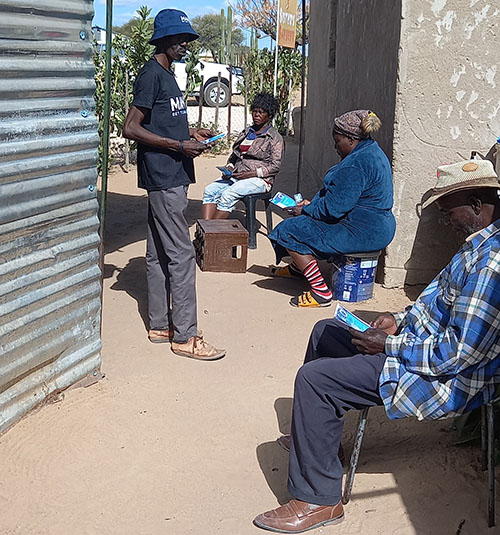Paheja Siririka
A traditional circumciser has said he is an advocate for the voluntary medical male circumcision programme due to its nature and understanding that it is no longer a traditional issue but a health matter.
Norich Uararakana Kaurika (44) is a respected traditional circumciser from Okakarara, a small town in Otjozondjupa, who takes pride in performing circumcisions because, for his tribe (Ovaherero), it dictates that every boy should be circumcised.
Kaurika said: “I decided to join as an advocate for the VMMC programme because the information to understand the process and benefits of circumcision is key and because it is no longer just a traditional practice but a crucial national HIV prevention strategy”.
He said this during a mobilisation session prearranged by the US Embassy, which advocates for various health programmes in the country, specifically tackling HIV in the country.
He underwent the SAFE VMMC training without knowledge that circumcision reduces the risk of HIV transmission.
According to him, he became a proud participant in the community mobiliser training where he learnt about the importance of circumcision in the fight against HIV.
Namibia’s health ministry with the US government-supported Scaling up Access For Expanded (SAFE) VMMC activity to circumcise 80% of the Namibian male population from 15 years and older.
The programme is funded by the President’s Emergency Plan for AIDS Relief (PEPFAR) through the United States Agency for International Development (USAID) and implemented by Abt Associates.
Abt Associates is a technology company that works with research, evaluation and programme implementation.
The company uses evidence-based and multi-disciplinary approaches to solving tough challenges in health, social and environmental policy and international development.
The part-time farmer and VMMC mobiliser encourage young boys and men in his community to take advantage of free HIV prevention services, additionally book clients and refer them to free VMMC outreach services.
Since his training, 13 of Kaurika’s clients have been successfully medically circumcised, six from Okakarara and seven from Otjiwarongo.
With an HIV prevalence of 8.45% among the general population living with HIV (2022 Spectrum Model), the Otjozondjupa region is one of 12 priority areas for Namibia’s VMMC scale-up plan in support of the health ministry’s HIV response.
Research shows that male circumcision reduces HIV transmission in men by 60%, and it is an important HIV prevention measure, especially when combined with other approaches.
In a recent interview with this journalist, the health ministry’s VMMC Demand Creation manager Johannes Haufiku stated that traditional circumcision has been practised in Namibia for many years – and the ministry, with the relevant stakeholders, has created awareness amongst traditional circumcisers to observe the necessary precaution during the procedure.
“Traditional circumcisers are also given basic information on HIV prevention so they prevent any spread of HIV,” stated Haufiku.
He added this is an ongoing process of reducing new HIV incidence by circumcising 300 000 sexually active men in Namibia.
The campaign stands at more than 200 000 men, who have been circumcised since the start of the programme in 2009. Haufiku expanded: “Resources towards the campaign have been a partnership between the Namibian government and donor agencies. Namibia has provided infrastructure medical consumables, staffing, transport and the list is endless”.
He stated this is part of the ongoing services provided and cannot be quantified as VMMC resources only, as donor agencies, namely Global Fund and PEPFAR also contribute towards supporting the government with similar cost items, such as staffing, transport and other programme costs.
– psiririka@nepc.com.na


